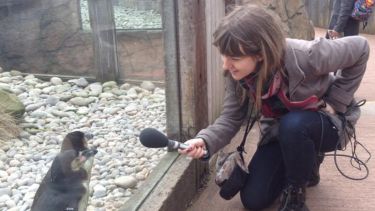From Zoology to science communication at Cambridge University

“Sheffield’s Zoology course was ranked as one of the highest in the country and offered a varied and interesting syllabus, but it was the sheer enthusiasm and welcoming vibe from the department on the open day that put Sheffield at the top of my UCAS form.
“My Zoology course began with a wide variety of subjects that allowed me to tailor the degree closely to my interests. Some highlights were the small, tutor-led discussions, lectures about dinosaurs, and multiple field trips to meet ducks, monkeys and earwigs up close. Weekly lab sessions also served to teach practical skills and introduce the scientific method.
“As well as the course content, the university and the department offered a number of opportunities to enrich student life and add colour to our CVs. During the course, I hitchhiked to Lithuania, became a committee member for the Biology Society, achieved the Sheffield Graduate Award and undertook a number of volunteering and training opportunities.
I've spent the last four years making podcasts and science programmes broadcast over the BBC and ABC Australia. Breaking down science content into meaningful and engaging stories for varied audiences is hectic but lots of fun.
Georgia Mills
MBiolSci Zoology
“The MBiolSci course also involved an extra year of research, which was an excellent introduction to lab life, and during which I became firm friends with my fossil thelodonts – fish from around 400 million years ago. This was very useful for someone considering a PhD, as it gave me enough of a taste of research to inform the decision that I absolutely didn’t want to do one. More positively, it provided experience in what I was really interested in: science communication.
“This interest led me to apply for an internship in the press office of The Natural History Museum. Here I got a taster of part of the process that takes research from the lab to the public, and it gave me enough experience to secure my first bona fide science communication job: radio production for The Naked Scientists at Cambridge University.
“I've spent the last four years making podcasts and science programmes broadcast over the BBC and ABC Australia. Breaking down science content into meaningful and engaging stories for varied audiences is hectic but lots of fun. It has taken me from simulated Martian surfaces to all-too-real sewers, and from drone racing in Shoreditch to Australian algae factories. I frequently use what I learned at Sheffield when reading and interpreting scientific papers and speaking with the scientists involved. The course also gave a fantastic grounding in how to interpret statistics properly and avoid the hyperbole and miscommunication still sometimes seen in science journalism.
“The future is a big unknown, but while plans to metamorphose into a fully-formed David Attenborough may be unattainable, as long as people keep doing science there will still be stories to tell, and new ways to tell them.”

International undergraduate scholarships
We are offering scholarships of £2,500 for each year (subject to a 60% average) of your undergraduate degree. The maximum value is £10,000 for four-year programmes.

